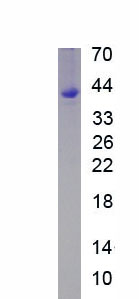Active 7-Dehydrocholesterol Reductase (DHCR7)
DHCR-7; SLOS; D7SR; Smith-Lemli-Opitz Syndrome; Putative sterol reductase SR-2; Sterol Delta(7)-reductase
- Product No.APC270Hu01
- Organism SpeciesHomo sapiens (Human) Same name, Different species.
- Buffer FormulationPBS, pH7.4, containing 0.01% SKL, 5% Trehalose.
- Traits Freeze-dried powder
- Purity> 95%
- Isoelectric Point7.9
- ApplicationsCell culture; Activity Assays.
- DownloadInstruction Manual
- UOM 10µg50µg 200µg 1mg 5mg
- FOB
US$ 350
US$ 874
US$ 1748
US$ 5244
US$ 13110
For more details, please contact local distributors!
ACTIVITY TEST

DHCR7 (7-dehydrocholesterol reductase) is a rate-limiting enzyme in cholesterol synthesis, which is mainly involved in the conversion of 7-dehydrocholesterol (7-DHC) to cholesterol. In the cholesterol biosynthetic pathway, this protease can reduce the C7-C8 double bond of cholesta-5,7-dien-3beta-ol (7-dehydrocholesterol/7-DHC) and cholesta-5,7,24-trien-3beta-ol, two intermediates in that pathway. In the absence of functional DHCR7, accumulation of 7DHC and a lack of cholesterol production leads to the devastating developmental disorder, Smith-Lemli-Opitz syndrome. Cholesterol 25-hydroxylase (CH25H) can also repress cholesterol biosynthetic enzymes. A functional ELISA assay was conducted to detect the interaction of recombinant human DHCR7 and recombinant human CH25H. Briefly, biotin-linked DHCR7 were diluted serially in PBS, with 0.01% BSA (pH 7.4). Duplicate samples of 100 ul were then transferred to CH25H-coated microtiter wells and incubated for 1h at 37℃. Wells were washed with PBST 3 times and incubation with Streptavidin-HRP for 30 min, then wells were aspirated and washed 5 times. With the addition of substrate solution, wells were incubated 15-25 minutes at 37℃. Finally, add 50 µl stop solution to the wells and read at 450 nm immediately. The binding activity of recombinant human DHCR7 and recombinant human CH25H was shown in Figure 1, the EC50 for this effect is 0.028 ug/mL.
USAGE
Reconstitute in 10mM PBS (pH7.4) to a concentration of 0.1-1.0 mg/mL. Do not vortex.
STORAGE
Avoid repeated freeze/thaw cycles. Store at 2-8°C for one month. Aliquot and store at -80°C for 12 months.
STABILITY
The thermal stability is described by the loss rate. The loss rate was determined by accelerated thermal degradation test, that is, incubate the protein at 37°C for 48h, and no obvious degradation and precipitation were observed. The loss rate is less than 5% within the expiration date under appropriate storage condition.
GIVEAWAYS
INCREMENT SERVICES
-
 BCA Protein Quantification Kit
BCA Protein Quantification Kit
-
 Molecular Mass Marker for Protein
Molecular Mass Marker for Protein
-
 Monoclonal Antibody Customized Service
Monoclonal Antibody Customized Service
-
 Polyclonal Antibody Customized Service
Polyclonal Antibody Customized Service
-
 Protein Activity Test Experiment Service
Protein Activity Test Experiment Service
-
 Electrophoretic Mobility Shift Assay (EMSA) Experiment Service
Electrophoretic Mobility Shift Assay (EMSA) Experiment Service
-
 Buffer
Buffer
-
 Lentivirus Packaging Experiment Service
Lentivirus Packaging Experiment Service
-
 Adenovirus Packaging Experiment Service
Adenovirus Packaging Experiment Service
-
 Real Time PCR Experimental Service
Real Time PCR Experimental Service
-
 Spike RBD Protein (S-RBD)
Spike RBD Protein (S-RBD)
-
 Protein G
Protein G
-
 Protein A
Protein A
| Catalog No. | Related products for research use of Homo sapiens (Human) Organism species | Applications (RESEARCH USE ONLY!) |
| RPC270Hu02 | Recombinant 7-Dehydrocholesterol Reductase (DHCR7) | Positive Control; Immunogen; SDS-PAGE; WB. |
| RPC270Hu01 | Recombinant 7-Dehydrocholesterol Reductase (DHCR7) | Positive Control; Immunogen; SDS-PAGE; WB. |
| APC270Hu01 | Active 7-Dehydrocholesterol Reductase (DHCR7) | Cell culture; Activity Assays. |
| CPC270Hu21 | OVA Conjugated 7-Dehydrocholesterol Reductase (DHCR7) | Immunogen; SDS-PAGE; WB. |
| PAC270Hu01 | Polyclonal Antibody to 7-Dehydrocholesterol Reductase (DHCR7) | WB |
| MAC270Hu22 | Monoclonal Antibody to 7-Dehydrocholesterol Reductase (DHCR7) | WB; IHC; ICC; IP. |
| SEC270Hu | ELISA Kit for 7-Dehydrocholesterol Reductase (DHCR7) | Enzyme-linked immunosorbent assay for Antigen Detection. |
| LMC270Hu | Multiplex Assay Kit for 7-Dehydrocholesterol Reductase (DHCR7) ,etc. by FLIA (Flow Luminescence Immunoassay) | FLIA Kit for Antigen Detection. |







